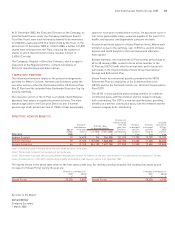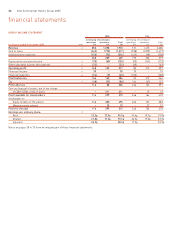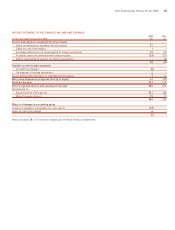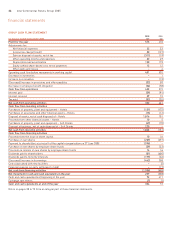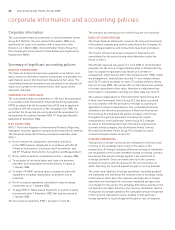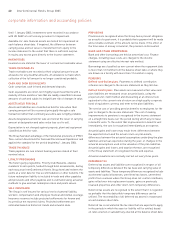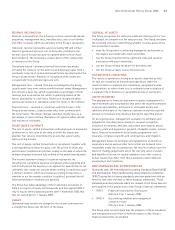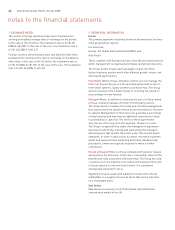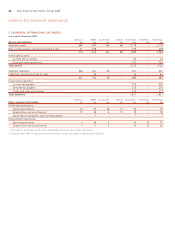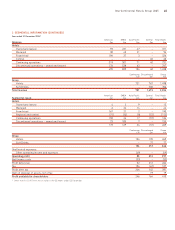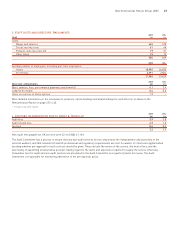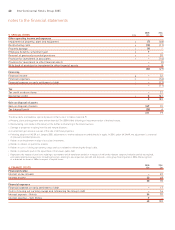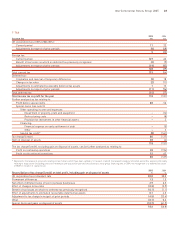Holiday Inn 2005 Annual Report Download - page 43
Download and view the complete annual report
Please find page 43 of the 2005 Holiday Inn annual report below. You can navigate through the pages in the report by either clicking on the pages listed below, or by using the keyword search tool below to find specific information within the annual report.
REVENUE RECOGNITION
Revenue is derived from the following sources: owned and leased
properties; management fees; franchise fees; sale of soft drinks
and other revenues which are ancillary to the Group’s operations.
Generally, revenue represents sales (excluding VAT and similar
taxes) of goods and services, net of discounts, provided in the
normal course of business and recognised when services have
been rendered. The following is a description of the composition
of revenues of the Group.
Owned and leased – primarily derived from hotel operations,
including the rental of rooms and food and beverage sales from a
worldwide network of owned and leased hotels operated under the
Group’s brand names. Revenue is recognised when rooms are
occupied and food and beverages are sold.
Management fees – earned from hotels managed by the Group,
usually under long-term contracts with the hotel owner. Management
fees include a base fee, which is generally a percentage of hotel
revenue, and an incentive fee, which is generally based on the
hotels’ profitability or cash flows. Revenue is recognised when
earned and realised or realisable under the terms of the contract.
Franchise fees – received in connection with the license of the
Group’s brand names, usually under long-term contracts with
the hotel owner. The Group charges franchise royalty fees as a
percentage of room revenue. Revenue is recognised when earned
and realised or realisable.
SHARE-BASED PAYMENTS
The cost of equity-settled transactions with employees is measured
by reference to fair value at the date at which the shares are
granted. Fair value is determined by an external valuer using
option pricing models.
The cost of equity-settled transactions is recognised, together with
a corresponding increase in equity, over the period in which any
performance conditions are fulfilled, ending on the date on which the
relevant employees become fully entitled to the award (vesting date).
The income statement charge for a period represents the
movement in cumulative expense recognised at the beginning and
end of that period. No expense is recognised for awards that do not
ultimately vest, except for awards where vesting is conditional upon
a market condition, which are treated as vesting irrespective of
whether or not the market condition is satisfied, provided that all
other performance conditions are satisfied.
The Group has taken advantage of the transitional provisions of
IFRS 2 in respect of equity-settled awards and has applied IFRS 2
only to equity-settled awards granted after 7 November 2002 that
had not vested before 1 January 2005.
LEASES
Operating lease rentals are charged to the income statement on
a straight line basis over the term of the lease.
DISPOSAL OF ASSETS
The Group recognises the sales proceeds and related profit or loss
on disposal on completion of the sales process. The Group considers
the following criteria in determining whether revenue and profit or
loss should be recorded:
• does the Group have a continuing managerial involvement to
the degree associated with asset ownership;
• has the Group transferred the significant risks and rewards
associated with asset ownership;
• can the Group reliably measure the proceeds; and
• will the Group actually receive the proceeds.
DISCONTINUED OPERATIONS
The results of operations arising from assets classified as held
for sale are classified as discontinued operations when the
results relate to a separate line of business, geographical area
of operations, or where there is a co-ordinated plan to dispose of
a separate line of business or geographical area of operations.
USE OF ESTIMATES
The preparation of financial statements requires management to
make estimates and assumptions that affect the reported amounts
of assets and liabilities, disclosure of contingent assets and
liabilities at the date of the financial statements and the reported
amounts of revenues and expenses during the reporting period.
On an ongoing basis, management evaluates its estimates and
judgements, including those relating to revenue recognition,
allowance for doubtful amounts, associates and financial assets,
property, plant and equipment, goodwill, intangible assets, income
taxes, financial instruments, hotel loyalty programme, self-
insurance, employee benefits and contingencies and litigation.
Management bases its estimates and judgements on historical
experience and on various other factors that are believed to be
reasonable under the circumstances, the results of which form the
basis for making judgements about the carrying value of assets
and liabilities that are not readily available from other sources.
Actual results may differ from these estimates under different
assumptions and conditions.
NEW STANDARDS AND INTERPRETATIONS
During the year, the International Accounting Standards Board (IASB)
and International Financial Reporting Interpretations Committee
(IFRIC) issued the following standards and interpretations with an
effective date after the date of these financial statements. These
standards and interpretations which are relevant to the Group have not
been applied in the preparation of the Group’s financial statements:
• IFRS 7 Financial Instruments: Disclosures
Effective from 1 January 2007
• IFRIC 4 Determining whether an arrangement
contains a lease
Effective from 1 January 2006
The Group does not anticipate that the adoption of these standards
and interpretations will have a material impact on the Group’s
financial statements on adoption.
InterContinental Hotels Group 2005 41




